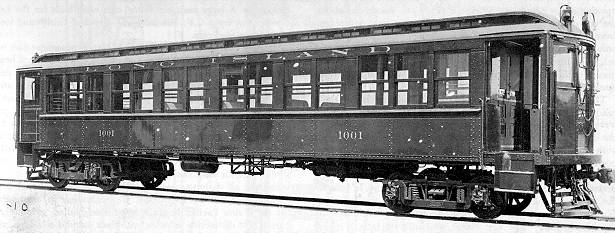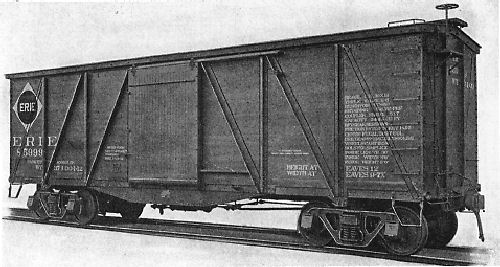American Car & Foundry - Page 2
But American Car and Foundry would continue building wooden and composite cars for at least another year. In 1911, AC&F’s Jeffersonville, IN, plant (formerly Ohio Falls Car Co.) built 100 wooden coaches for the New York Central. But the last car of this order “was the last new wooden car acquired by a major domestic railroad.” {51} During the 1st World War, American Car & Foundry produced artillery gun mounts and ammunition, field kitchens, pack saddles, submarine chasers, cloth shrinking machines and rollers, and even wooden tent pegs, as well as railway cars, for the Allies. AC&F’s Wilmington, DE, plant (formerly Jackson & Sharp) also produced boats for the navy, and after the war switched production to yachts.
By the early 1920s, American Car & Foundry owned 16 plants in nine states. Some were huge factories, like Berwick, capable of building almost any type of car, while others were very specialized. In 1922, American Car & Foundry entered the automotive field by acquiring Carter Carburetor Corporation of St. Louis. In 1924 (31 March), American Car & Foundry acquired Pacific Car & Foundry of Seattle. In 1925, American Car & Foundry acquired Fageol Motors Company, a California bus builder, and the Hall-Scott Motor Car Company of Berkeley, California, which produced bus engines. In 1926, American Car & Foundry acquired streetcar builder J. G. Brill Company of Philadelphia. In 1927, American Car & Foundry acquired Shippers Car Line, a tank car leasing operation begun in 1917. When the 2nd World War began in Europe on 1 September 1939, the Berwick plant began building tanks for the United States government. On 2 August 1941, the 1000th tank rolled off the assembly line. One source says Berwick produced 15,000 tanks, and was the largest producer of armor plate in the world. Other AC&F plants produced tanks, aircraft subassemblies, artillery shells, armor plate, and hospital cars, as well as ordinary railroad cars. In 1944, the Brill interests were merged into ACF-Brill Motors, Inc. In 1954, the company changed its name to ACF Industries, Inc., reflecting its great diversification. ACF produced its last passenger car in 1959, but is still building freight cars through its affiliate, American Railcar Industries, a spin-off of its Shippers Carline Division headquartered in St. Louis. Cast of Characters —William Keeny Bixby (1857-1931) is credited with forming the American Car & Foundry Company. Born in Adrian, MI, he began his railway career in 1870 as a night watchman and baggage man for the International Great Northern Railroad at Palestine, Texas. He was soon promoted to the post of general baggage agent in San Antonio. He next moved to St. Louis, where he became printing and stationery buyer for all the Gould lines. After several years he became a lumber agent for the Missouri Car & Foundry Company of St. Louis. He was promoted to Vice-President within two years and later became its President. As head of Missouri Car & Foundry, Bixby engineered a consolidation with the Michigan-Peninsular Car Company of Detroit, then added 12 other independent car builders to become the American Car & Foundry Company, of which he was the first President, serving from 1899 to 1901. He thereafter became Chairman of the Board, then retired in 1905. Not one to be idle, Bixby then earned two college degrees (L.L.D. [law] degree from the University of Missouri 1907, M.A. at Amherst College in 1913); was a Charter Member at the Incorporation of the American Red Cross; served as Receiver for the Wabash Railroad from 1909 to 1914; and participated in a number of educational and philanthropic enterprises. He was Honorary president of the Provident Association and the Archaeological Society (both of St. Louis). For a time he served as President of the City Art Museum and of Washington University, and directed St. Luke's Hospital in St. Louis. In Washington, D.C., he was affiliated with the American Federation of Art, served as a trustee for the Y.W.C.A. Endowment Fund, Girls' Industrial Home. He also directed the National Gallery of Art (now the National Museum of American Art). It is interesting that American Car & Foundry Company; A Centennial History, 1899-1999 by Edward S. Kaminski (a) makes no mention whatsoever of William Bixby, (b) mentions Missouri Car & Foundry only three times and that just in regard to the origin of its St. Louis plant, and (c) attributes the “origin” of ACF to the founding in 1840 of Jackson & Woodin at Berwick, Pennsylvania, a location of which it seems quite proud. How quickly we forget ... For More Information —Kaminski, Edward S. American Car & Foundry Company 1899-1999. Berkeley, CA: Signature Press, 1999.
Online —
|

